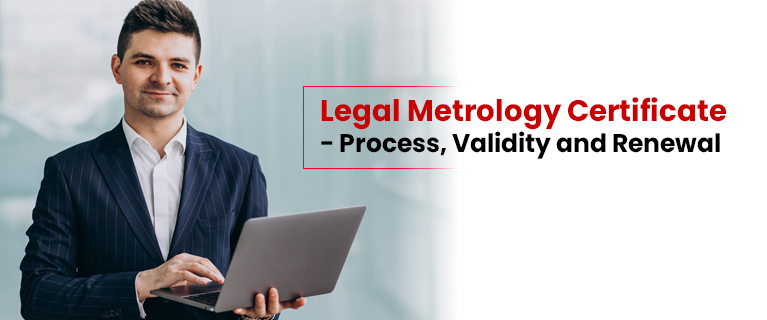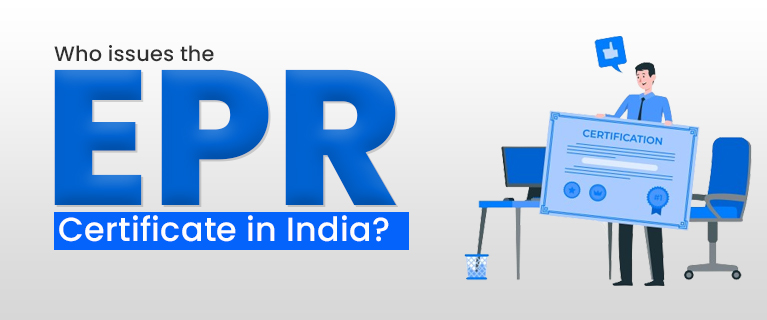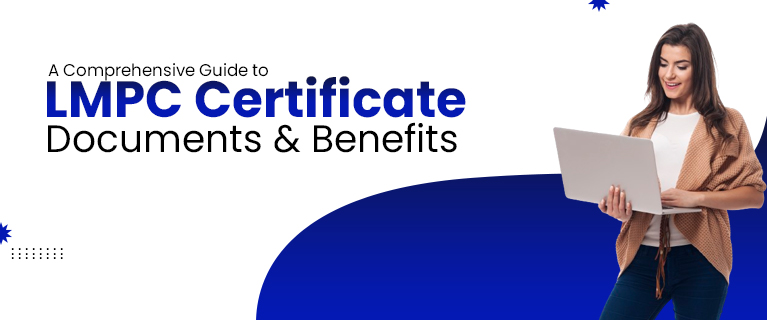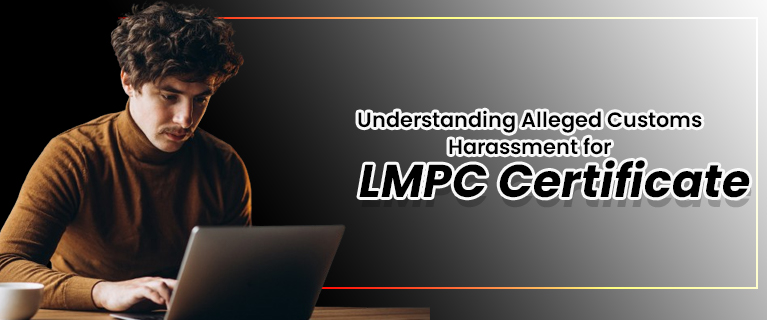Legal Metrology Certificate- Process, Validity and Renewal
Obtaining a Legal Metrology Certificate in India is a crucial step for businesses involved in the manufacturing, import, distribution, or sale of weighing and measuring instruments and devices. The Legal Metrology Act, 2009, governs this certification process, aiming to ensure fair trade practices and consumer protection. In this comprehensive guide, we'll explore the steps involved in acquiring a Legal Metrology Certificate in India.
Understanding Legal Metrology:
Legal Metrology involves the science of measurement applied to legal requirements and regulations. In India, the Legal Metrology Act, 2009, and the Legal Metrology (Packaged Commodities) Rules, 2011, lay down the framework for regulating weights and measures used in trade and commerce.
Read also this -: Understanding the Different Types of LMPC CertificatesEligibility Criteria:
Before initiating the certification process, businesses need to ensure they meet the eligibility criteria. Generally, any entity involved in manufacturing, repairing, selling, or distributing weighing and measuring instruments falls under the purview of Legal Metrology regulations.
Step-by-Step Guide to Obtain Legal Metrology Certificate:
Let's delve into each step of obtaining a Legal Metrology Certificate in detail:
1. Preparation and Documentation:
Proof of Business Registration: Provide legal documents confirming your business's registration. Address Proof: Submit documents verifying the business address. Manufacturing Process Details: Outline the manufacturing processes involved in your products. Product List: Compile a comprehensive list of the products falling under legal metrology regulations. Compliance with Standards: Ensure that your products adhere to the relevant Indian Standards, as specified by the legal metrology Certificate
2. Application Submission:
Form Submission: Fill out and submit the application form for the Legal Metrology Certificate to the Controller of Legal Metrology in your state or union territory. Document Submission: Attach all the required documents to support your application.
3. Inspection:
Premises Inspection: Expect authorities to conduct an on-site inspection to verify that your business complies with legal requirements.
Compliance Check: During the inspection, officials will assess whether instruments and processes align with regulatory standards.
4. Testing of Instruments:
Sample Submission: Provide samples of weighing and measuring instruments used in your business. Authorized Laboratories: Instruments will undergo testing at laboratories authorized by legal metrology authorities.
Compliance Assessment: The testing process ensures that instruments meet accuracy and calibration standards.
5. Verification and Stamping:
Successful Testing: After successful testing, authorized inspectors will verify, stamp, and seal the instruments.
Compliance Assurance: The stamp indicates that the instruments comply with legal metrology requirements.
6. Fee Payment:
Prescribed Fees: Pay the specified fees, which can vary based on factors such as the number and type of instruments, as well as the nature of the business.
7.Certificate Issuance
Completion of Steps: Once all steps are successfully completed, the Legal Metrology Certificate will be issued. Compliance Recognition: The certificate signifies that your business operations and products adhere to the legal metrology standards in place.
Read also this -: How to Apply LMPC Certificate Online: Step-by-Step GuideIt's crucial to follow each step meticulously to ensure a smooth and compliant certification process.
Challenges and Compliance of Legal Metrology Certificate:
While obtaining a Legal Metrology Certificate is essential, businesses should be aware of ongoing compliance requirements. Regular inspections may be conducted to ensure continued adherence to legal metrology standards. Failure to comply with these standards can lead to penalties, fines, or even legal action. Here are some challenges and considerations related to compliance:
1.Changing Regulations:
- Staying abreast of evolving legal metrology regulations and standards can be challenging, requiring continuous monitoring to ensure ongoing compliance.
2. Complexity of Standards:
- Legal metrology standards can be intricate, and interpreting and implementing them correctly can pose a challenge for businesses.
3. Instrument Calibration:
- Ensuring that weighing and measuring instruments remain calibrated and accurate over time can be a logistical challenge, especially in dynamic business environments.
4. Documentation Management:
Managing and updating the required documentation, including records of inspections, testing, and certifications, demands a systematic approach.
Compliance Measures:
1. Regular Audits and Internal Controls:
- Conduct internal audits to assess compliance regularly. Establish robust internal controls to identify and rectify any deviations promptly.
2. Employee Training:
- Train employees on legal metrology standards to enhance awareness and ensure that everyone involved understands and follows compliance procedures.
3. Continuous Monitoring:
- Implement systems for continuous monitoring of instruments and processes, ensuring that any deviations are detected and addressed promptly.
4. Responsive to Regulatory Changes:
- Stay proactive in monitoring and adapting to changes in legal metrology regulations. This includes promptly adjusting processes and instruments to align with updated standards.
5. Record Keeping:
- Maintain accurate and up-to-date records of all compliance-related activities, inspections, and certifications. This documentation is vital during audits or inspections.
6. Communication with Authorities:
- Establish open communication channels with legal metrology authorities. Inform them of any changes in business operations or equipment to ensure transparency.
By addressing these challenges and proactively implementing compliance measures, businesses can not only obtain the Legal Metrology Certificate but also sustain a culture of ongoing adherence to standards, minimizing the risk of penalties or legal repercussions.
Benefits of Legal Metrology Certification:
Let's delve into the details of each benefit of Legal Metrology Certification:
1. Consumer Confidence:
When products bear the Legal Metrology Certification, it assures consumers that the items they are purchasing meet the required legal standards for accuracy and measurement. This certification acts as a visible mark of quality, instilling confidence in consumers about the reliability and fairness of the products they are buying.
2. Avoidance of Legal Issues:
Legal metrology Certification are in place to ensure fair trade practices and protect consumers. By complying with these standards and obtaining certification, businesses reduce the risk of legal issues, fines, or penalties. It demonstrates a commitment to following the law and conducting operations ethically, contributing to the long-term sustainability of the business.
3. Global Trade:
Many countries have established legal metrology requirements to regulate the accuracy of measurements in trade. Obtaining Legal Metrology Certification makes it easier for businesses to engage in international trade, as it signifies that their products meet not only local but also globally recognized standards. This can streamline cross-border transactions and contribute to the expansion of market reach.
4. Brand Reputation:
Adhering to legal metrology standards enhances a brand's reputation. It communicates to consumers and stakeholders that the business is committed to maintaining high standards of quality and fairness. A positive brand reputation can lead to increased customer loyalty, positive word-of-mouth, and a competitive advantage in the market.
Legal Metrology Certification is not only necessary for compliance with regulations; it is also an effective instrument that companies may use to negotiate global marketplaces, gain the trust of clients and partners, and position themselves as respectable and accountable organisations.
Read also this -: Introduction To LMPC Certificate For Imports, Its Role & Registration ProcessConclusion:
In conclusion, the acquisition of a Legal Metrology Certificate in India emerges as a strategic imperative for businesses operating in the intricate domain of weights and measures. In this context, it is paramount for enterprises to adopt a proactive approach, meticulously navigating the certification process to ensure their instruments align scrupulously with the stipulated legal standards. This unwavering commitment to compliance not only serves to safeguard the interests of consumers but also plays an instrumental role in cultivating a marketplace characterized by a heightened sense of fairness and transparency.
As the economic landscape of India continues to undergo dynamic transformations, with the nation solidifying its position as a major player in the global economy, businesses are confronted with the pressing need to recognize and embrace the profound significance of a legal metrology certificate. This recognition extends beyond mere regulatory adherence; it underscores a broader commitment to upholding equitable trade practices that resonate on an international scale.
In essence, a legal metrology certificate becomes a linchpin in the overarching objective of establishing India as a hub for fair and ethical business practices. The certification process, while at times intricate, serves as a conduit for businesses to not only meet regulatory standards but to proactively contribute to the creation of a marketplace where consumer rights are diligently protected. Therefore, as businesses traverse the dynamic landscape of the global economy, a conscientious acknowledgment of the pivotal role played by legal metrology becomes indispensable in shaping a future where fair trade practices are not just mandated by law but ingrained in the ethos of responsible and sustainable business operations.










